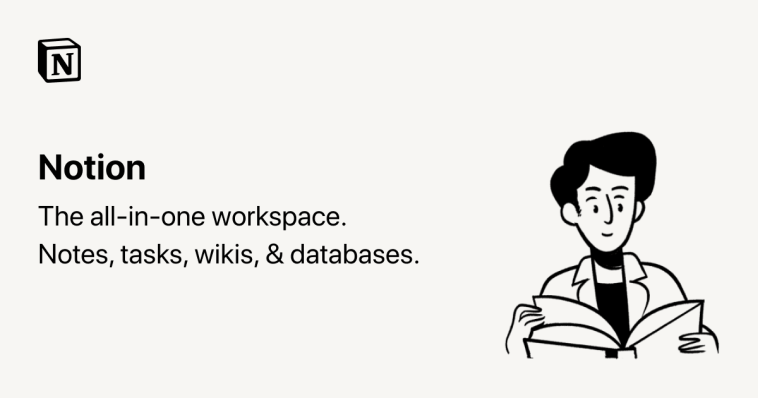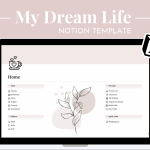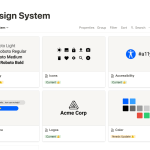Introduction.
In our modern, fast-paced lives, staying organized and maximizing productivity have become more important than ever.
With numerous tasks, projects, and responsibilities vying for our attention, having a centralized hub to manage and streamline our digital lives is crucial.
Notion, a powerful all-in-one workspace, offers a versatile platform that allows you to create a personalized dashboard to organize your tasks, goals, and information in one place.
In this guide, we will explore how to set up your Notion dashboard effectively, empowering you to take control of your digital life and enhance your productivity.
Notion’s intuitive interface, flexible features, and customizable layouts provide the foundation for creating a central hub that reflects your unique workflow and organizational preferences.
Your Notion dashboard serves as a visual command centre, bringing together important information, task lists, calendars, and project management tools into a cohesive workspace.
By setting up your dashboard thoughtfully, you can optimize your workflow, access key information quickly, and keep your projects and goals on track.
Throughout this guide, we will delve into the fundamental steps required to create a functional and visually appealing Notion dashboard.
We will explore how to organize your workspace using pages, sections, and databases to categorize your information effectively.
Additionally, we’ll discuss techniques for integrating task management systems, calendars, and note-taking capabilities into your dashboard, allowing for seamless navigation and efficient workflow.
Hey there, dear reader! We hope you’re enjoying the content on our blog. Did you know we have a treasure trove of other insightful articles waiting for you?
Checkout the links to the article below to become more productive and scale your Notion experience.
- How To Make Money Selling Notion Templates
- How To Make Money Online With Notion
- How To Make Money With Notion Templates
- How To Become a Notion Consultant
- How To Personalize Notion
- How To Use Notion For Social Media Management
- How To Sell Notion Templates On Etsy
- How To Build a Website On Notion
- How To Build Your Portfolio On Notion
- How To Use Notion For Personal Use
- How To Use Notion For Research
What Is Notion?
Notion is a powerful all-in-one workspace and productivity tool that allows users to organize their thoughts, collaborate with others, and manage projects and tasks.
It provides a flexible and customizable platform for creating and organizing various types of content, including notes, documents, databases, wikis, project boards, and more.
Notion offers a visual and intuitive interface where users can create pages and subpages, drag and drop elements, and arrange content in a way that suits their needs.
It supports rich media integration, enabling users to embed files, images, videos, and other types of content directly into their pages.
One of the key features of Notion is its database functionality, which allows users to create dynamic databases with customizable properties and views.
This makes it useful for managing tasks, tracking projects, creating knowledge bases, and organizing information in a structured manner.
Hey there, dear reader! We hope you’re enjoying the content on our blog. Did you know we have a treasure trove of other insightful articles waiting for you?
Checkout the links to the article below to become more productive and scale your Notion experience.
- How To Make Money Selling Notion Templates
- How To Make Money Online With Notion
- How To Make Money With Notion Templates
- How To Become a Notion Consultant
- How To Personalize Notion
- How To Use Notion For Social Media Management
- How To Sell Notion Templates On Etsy
- How To Build a Website On Notion
- How To Build Your Portfolio On Notion
- How To Use Notion For Personal Use
- How To Use Notion For Research
What are The Benefits Of Using Notion?
Notion, an all-in-one workspace and productivity tool, has emerged as a game-changer for individuals and teams seeking a versatile platform to streamline their workflow.
With its flexible interface and comprehensive feature set, Notion offers a range of benefits that empower users to organize their thoughts, collaborate effectively, and manage projects efficiently.
1. Versatility and Customization.
Notion’s greatest strength lies in its versatility and customization options. Users have the freedom to design their workspace exactly as they envision, thanks to its flexible page structure and drag-and-drop functionality.
Whether creating personal to-do lists, knowledge bases, project trackers, or team wikis, Notion adapts to individual needs.
It allows users to structure information, create linked databases, embed media, and customize properties, providing a tailored experience for each user.
2. Seamless Collaboration.
Collaboration is at the heart of Notion. Users can effortlessly share their workspaces or specific pages with team members, enabling real-time collaboration and fostering efficient communication.
Features like commenting, task assignments, and mentioning collaborators promote teamwork and ensure everyone stays on the same page.
With a centralized hub for project management and collaboration, teams can coordinate effectively, improve transparency, and enhance productivity.
3. Powerful Database Functionality.
Notion’s robust database functionality transforms information management. Users can create dynamic databases with customizable properties, filters, and views.
This enables efficient organization, tracking, and analysis of data, making it an invaluable tool for task management, project tracking, content creation, and more.
With Notion’s database capabilities, users can turn their workspace into a powerful knowledge base that adapts to their evolving needs.
4. Enhanced Task and Project Management.
Notion simplifies task and project management with its intuitive interface and powerful features. Users can create to-do lists, set deadlines, assign tasks, and visualize progress using Kanban boards, calendars, or timelines.
The flexibility to switch between different views allows for a holistic understanding of projects and enables teams to manage complex workflows effectively.
With integrated reminders and notifications, users can stay on top of their tasks and never miss a deadline.
5. Centralized Information Hub.
Gone are the days of juggling multiple apps and tools. Notion serves as a centralized hub for all your information, eliminating the need for switching between platforms. Users can integrate third-party tools, import data, and embed files, fostering a seamless workflow.
Whether it’s taking notes, creating documentation, organizing research, or managing personal tasks, having everything in one place boosts efficiency and reduces cognitive overload.
6. Cross-Platform Accessibility.
Notion’s accessibility across various platforms is a significant advantage. It is available as a web application and offers dedicated desktop and mobile apps for a smooth user experience.
This cross-platform support ensures users can access and update their workspace from anywhere, whether at their desks or on the go.
Real-time syncing ensures that changes made on one device are instantly reflected across all others, allowing for seamless collaboration and uninterrupted productivity.
7. Integration with Productivity Tools.
Notion understands the importance of seamless integration with other productivity tools. It offers integrations with popular apps and services like Google Drive, Trello, Slack, and more.
This integration allows users to bring data from external sources into Notion, sync information across platforms, and further enhance their production workflows.
By consolidating data and tasks from different tools, Notion becomes a hub that connects and streamlines various aspects of work.
8. Distraction-Free Writing and Note-Taking.
Notion’s clean and distraction-free interface makes it an ideal platform for writing and note-taking. Whether you’re jotting down ideas, drafting blog posts, or capturing meeting minutes, Notion provides a focused environment that promotes creativity and deep work.
With the ability to format text, add images, and create hierarchical structures, users can organize their thoughts and ideas in a visually appealing manner.
9. Knowledge Sharing and Documentation.
Notion serves as an excellent tool for knowledge sharing and documentation within teams or organizations.
Its wiki-like functionality allows users to create an internal knowledge base, capture and share best practices, and document standard operating procedures (SOPs).
By centralizing information in Notion, teams can ensure that knowledge is easily accessible, searchable, and up-to-date, fostering collaboration, reducing redundancy, and promoting a culture of continuous learning.
10. Personal Productivity and Organization.
Notion isn’t limited to team collaboration; it also caters to individual users seeking to enhance their productivity and organization.
With customizable templates, users can create personal dashboards, habit trackers, goal trackers, and more.
Notion’s flexible structure adapts to personal workflows, enabling users to manage their tasks, track their progress, and maintain a bird’s-eye view of their goals and projects.
Hey there, dear reader! We hope you’re enjoying the content on our blog. Did you know we have a treasure trove of other insightful articles waiting for you?
Checkout the links to the article below to become more productive and scale your Notion experience.
- How To Make Money Selling Notion Templates
- How To Make Money Online With Notion
- How To Make Money With Notion Templates
- How To Become a Notion Consultant
- How To Personalize Notion
- How To Use Notion For Social Media Management
- How To Sell Notion Templates On Etsy
- How To Build a Website On Notion
- How To Build Your Portfolio On Notion
- How To Use Notion For Personal Use
- How To Use Notion For Research
How Do I Set Up My Notion Dashboard?
Notion, a versatile all-in-one workspace, offers a powerful platform that allows you to create a customized dashboard to streamline your digital life and enhance productivity.
In this article, we will explore how to set up your Notion dashboard effectively, providing you with a comprehensive guide to personalizing your productivity and streamlining your organization.
1. Define Your Goals and Objectives.
Before diving into setting up your Notion dashboard, take some time to define your goals and objectives.
What do you want to achieve with your dashboard? Are you looking to enhance productivity, track projects, manage tasks, or organize information? Understanding your specific needs and desired outcomes will guide your dashboard setup process.
2. Plan Your Dashboard Structure.
Consider the different components you want to include in your Notion dashboard. These could range from to-do lists, calendars, project trackers, databases, note-taking sections, or any other elements that align with your goals.
Visualize the layout and structure of your dashboard, organizing it into sections or pages based on your preferred workflow.
3. Customize Your Dashboard’s Design.
Notion allows you to personalize the design of your dashboard to suit your preferences and aesthetics.
Experiment with different templates, colours, fonts, and layouts to create an environment that inspires and motivates you. Customize icons and visuals to make your dashboard visually appealing and intuitive.
4. Integrate Task Management Systems.
Incorporate task management systems within your Notion dashboard to keep track of your to-do lists and deadlines.
Utilize Kanban boards, checklists, or calendars to manage and prioritize your tasks effectively. Set reminders and due dates to ensure nothing falls through the cracks.
5. Utilize Calendars and Scheduling Tools.
Integrate calendars into your Notion dashboard to manage your schedule efficiently. Include important events, meetings, deadlines, and personal commitments.
Utilize colour-coding and time-blocking techniques to visualize your time and optimize your productivity.
6. Organize Information with Databases.
Create databases within your Notion dashboard to organize and access information easily. Use databases for storing reference materials, contacts, project details, or any other relevant data. Utilize filters and tags to quickly locate specific information and streamline your workflow.
7. Collaborate and Share:
Notion’s collaboration features allow you to share your dashboard with team members, colleagues, or friends.
Collaborate on projects, assign tasks, and provide updates in real-time. Leverage comments and mentions to facilitate effective communication and shared accountability.
8. Continuously Refine and Adapt.
As your needs and priorities evolve, regularly review and refine your Notion dashboard. Modify layouts, update templates, or add new sections to accommodate changes in your workflow. Embrace experimentation and adaptability to ensure your dashboard remains effective and relevant.
Hey there, dear reader! We hope you’re enjoying the content on our blog. Did you know we have a treasure trove of other insightful articles waiting for you?
Checkout the links to the article below to become more productive and scale your Notion experience.
- How To Make Money Selling Notion Templates
- How To Make Money Online With Notion
- How To Make Money With Notion Templates
- How To Become a Notion Consultant
- How To Personalize Notion
- How To Use Notion For Social Media Management
- How To Sell Notion Templates On Etsy
- How To Build a Website On Notion
- How To Build Your Portfolio On Notion
- How To Use Notion For Personal Use
- How To Use Notion For Research
Conclusion.
Setting up a personalized Notion dashboard can revolutionize your productivity and organization. By following the steps outlined in this article, you can create a centralized hub tailored to your specific needs, enabling you to streamline tasks, manage projects, and access information efficiently.
Remember to continually refine and adapt your dashboard as your goals and priorities evolve.
With Notion as your digital companion, you have the power to take control of your digital life, boost productivity, and achieve your objectives with ease.
So, embark on your Notion dashboard journey and experience the transformational benefits of personalized productivity and streamlined organization.
Hey there, dear reader! We hope you’re enjoying the content on our blog. Did you know we have a treasure trove of other insightful articles waiting for you?
Checkout the links to the article below to become more productive and scale your Notion experience.
- How To Make Money Selling Notion Templates
- How To Make Money Online With Notion
- How To Make Money With Notion Templates
- How To Become a Notion Consultant
- How To Personalize Notion
- How To Use Notion For Social Media Management
- How To Sell Notion Templates On Etsy
- How To Build a Website On Notion
- How To Build Your Portfolio On Notion
- How To Use Notion For Personal Use
- How To Use Notion For Research






GIPHY App Key not set. Please check settings